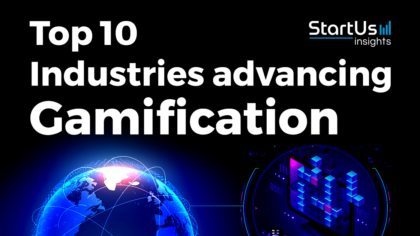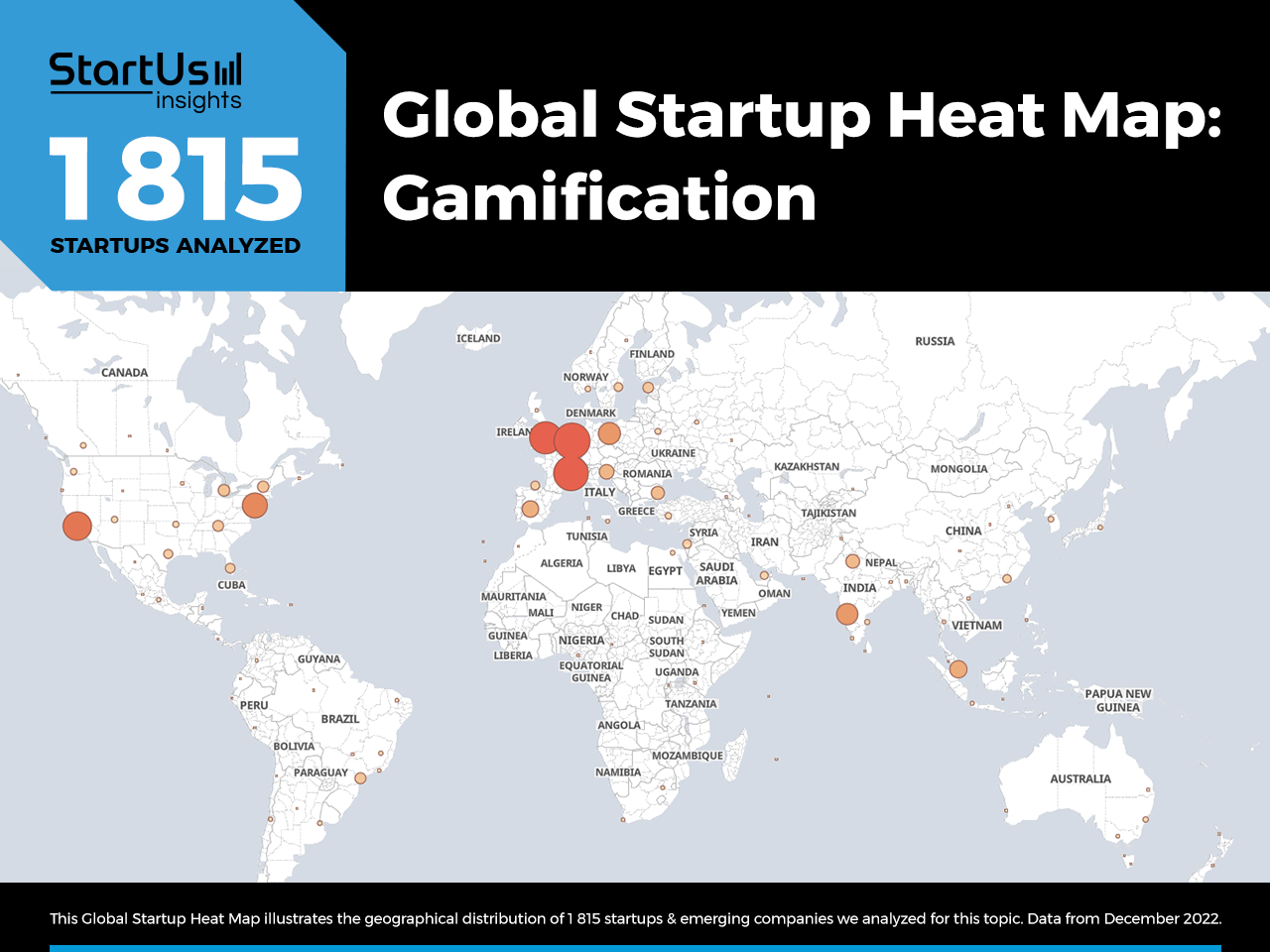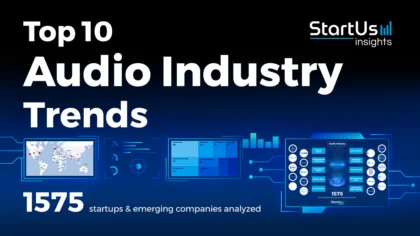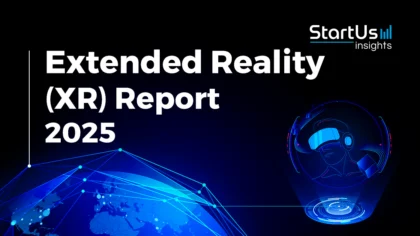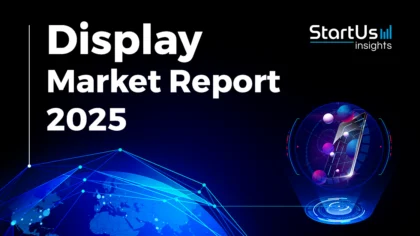Businesses are leveraging gamification to make customer and employee interactions more engaging. For this, startups integrate game-design elements and game principles in non-game contexts. They enhance user engagement, knowledge retention, employee evaluation, and more. This article provides you with examples of gamification applications based on our analysis of 1815 startups & technologies and their impact on 10 industries. Read more to explore the impact of gamification on these industries and how they impact your business.
Tree Map reveals the Impact of Gamification on 10 Industries
The Tree Map below illustrates the impact of gamification applications on 10 industries in 2023 and 2024. Startups and scaleups are transforming customer interactions to enable more digital touchpoints and drive sales. That is why the marketing, media, retail, entertainment, food, and beverage industries leverage gamification, improving customer experience. On the other hand, education and training institutions gamify curriculum content to enable gamified learning.
This improves learning experiences and knowledge retention. The finance sector integrates gamification into its product offerings to improve financial literacy and aid trading decisions. Further, healthcare institutions simplify patient management and outpatient care with gamification. Lastly, gamification enhances employee engagement while transportation companies utilize it to improve traveler experiences.
Global Startup Heat Map covers 1815 Gamification Startups & Scaleups
The Global Startup Heat Map below highlights the global distribution of the 1815 exemplary startups & scaleups that we analyzed for this research. Created through the StartUs Insights Discovery Platform that covers 3 790 000+ startups & scaleups globally, the Heat Map reveals that Western Europe has a high concentration of gamification startups, followed by the US.
Below, you get to meet 10 out of these 1815 promising startups & scaleups as well as the solutions they develop. These examples of gamification are hand-picked based on criteria such as founding year, location, funding raised & more. Depending on your specific needs, your top picks might look entirely different.
Best Gamification Examples from 10 Industries (2023-24)
1. Marketing
The flexibility of social media enables marketing companies to reach a wider audience without capital expenses. However, they need to find unique means to engage with customers and drive views or sales. To do this, marketing firms gamify their content and develop targeted games that better connect with their audiences.
Such gamification examples help brands increase customer engagement and loyalty. Moreover, gamified content provides marketers with highly relevant customer information by rewarding customers for sharing certain information. Brands thus leverage gamification to build a loyal customer base that makes repeat purchases.
Adact aids Gamification Campaign Management
Adact is an Estonian startup that develops a platform for gamification campaign management. Its no-code interface allows marketers and brands to select a game from its catalog and customize it based on campaign requirements. The platform also allows them to define campaign target and creates unique landing pages for each campaign. It then applies real-time analytics on the acquired data to identify leads while also enabling marketers to replicate successful campaigns and expand them to new languages.
2. Education
Integrating game elements and mechanics in classrooms makes learning fun and engaging. This greatly improves student performance in primary, middle, and secondary schools. Moreover, a gamification curriculum allows students to better understand complex topics through interactive learning.
Gamified learning motivates students in their studies by ensuring a sense of competition and achievement. For teachers, gamification provides student-specific information that aids them in understanding student learning preferences. This allows educational institutions to improve overall teaching effectiveness and student performance.
Matematigo gamifies Mathematics for Kids
Turkish startup Matematigo addresses quality of education challenges by creating a game that teaches mathematics in a fun way. By gamifying mathematical questions from easy to hard, the game allows children to learn while having fun and improving their algorithmic thinking and numerical problem-solving skills. Further, its games are aligned with the school curriculum, ensuring the benefits of such learning are seen in school work too.
3. Media
Similar to marketing companies, the media industry now delivers gamified content to their audiences to increase engagement. To aid this, startups develop gamification platforms that create gamified content from no-code inputs. This allows media companies to accelerate production workflows.
Through gamification, they also offer reward programs for audiences taking part in surveys, enabling advanced analytics capabilities for media businesses. Gamification examples in marketing campaigns and videos further make content shareable across social media platforms, allowing them to increase viewership.
Sport BUFF enhances Fan Engagement
Sport BUFF is a UK-based startup that improves fan engagement. The startup’s solution allows media businesses to integrate gamified content into live, video-on-demand (VOD), and archived sports content. This enables them to monetize their audience through transactions and sponsorship. Further, the solution allows fans to play with and against their friends, improving engagement. This, in turn, improves audience retention and watch times while providing new fan data points.
4. Retail
Retail businesses are transitioning to eCommerce channels to expand their customer base. At the same time, social commerce is gaining traction among consumers as they are able to interact with brands and influencers directly. To better utilize these online commerce channels, businesses deliver gamified content and offers to their customers.
This improves customer engagement and brand awareness. Startups aid this by offering gamification solutions powered by AI or machine learning. They personalize content delivery by using customer preferences and purchase history. Other startups create no-code gamification platform that accelerates content workflow for retailers and brands.
Gamifiera offers a Gamified eCommerce Communications Platform
Swedish startup Gamifiera builds a platform to help e-commerce brands build engaged online communities and increase customer loyalty. It features user-generated content like reviews, and 3D avatars to foster a sense of community and tools to turn tasks into rewarding experiences.
For example, its highly customizable Gamification Engine is designed to cater to business objectives and customer profiles. By providing personalized gamified experiences, the startup ensures that customers feel recognized and valued, thus enhancing their engagement with brands.
5. Finance
Lack of financial education negatively affects the financial decisions of people and this keeps them away from many financial management tools. The finance industry leverages gamification to provide engaging educational content. Such solutions feature reward systems and challenges, making financial education more interactive.
Further, some startups offer gamified learning solutions for trading and investing. As financial awareness increases among the general public, banks and fintechs then convert them into leads, driving sales. They utilize the customer-specific data obtained from gamified content to develop analytics tools, allowing finance companies to personalize product and service offerings.
DeFi Land Foundation builds Gamified Decentralized Finance (DeFi)
DeFi Land Foundation is a Taiwanese startup that gamifies DeFi. The startup’s multi-chain agriculture-simulation game allows players to start participating for free and then eventually moves them to play 2-earn tiers. This allows them to compete with others while allowing them to manage DeFi assets in one place. Making DeFi interactions gamified also increases user engagement and ensures a better understanding of DeFi. Additionally, the startup offers unique non-fungible tokens (NFTs).

6. Entertainment
While gaming is an integral part of the entertainment sector, it integrates gamified offerings throughout other activities such as music concerts and museums. Some music venues leverage gamification to engage customers through scavenger hunts while movies, like Black Mirror: Bandersnatch, allow viewers to make decisions for characters.
Advances in virtual reality (VR) also enable entertainment companies to deliver engaging and interactive content to the audience. Businesses further utilize gamification to improve brand engagement and make high-performance marketing campaigns for events like movies and concerts.
Life Festa delivers Gamfied Daily Activities
Life Festa is a South Korean startup that gamifies daily activities in the metaverse. The startup’s solution allows users to earn coins, digital assets, and life stamps by completing real-life challenges. It also enables them to discover trendy local spots and meetups. Through this, the startup motivates users to follow healthy behavior while delivering better social connectivity and entertainment.
7. Healthcare
Unlike other industries that use gamification for marketing, the healthcare industry leverages it to improve patient care. Making patients compliant with medications and lifestyle changes is difficult due to a lack of monitoring capabilities once they leave hospitals. With wearables and gamification apps, physicians are able to provide engaging means to promote healthy behavior through daily challenges.
For instance, fitness tracking apps gamified challenges and rewards to exercise regularly and monitor progress. Further, clinical trials are leveraging gamification to use leaderboards to motivate patients to adhere to treatment plans and encourage feedback sharing.
Elfie aids in Chronic Disease Management
Elfie is a Singaporean startup that simplifies chronic disease management. The startup’s app rewards patients for taking care of their hypertension. It also creates personalized plans based on patient profiles and conditions, including plans for blood pressure monitoring and medical treatments.
Further, the app visualizes vital records when patients add the data manually to provide alerts and feedback on official guidelines. Through these features, the app generates treatment adherence scores and enables physicians to view this information on demand.
8. Food & Beverage
The food and beverage industries utilize gamified content to improve marketing efforts and deliver nutrition education. Integrating interactive content through smart packaging takes consumers to brand-specific stories and data. Further, this novel medium allows them to interact directly with brands and exchange customer-specific data, aiding marketing decisions.
On the other hand, offering nutrition data through gamification educates consumers on ingredients and diets. By coupling such data with fitness tracking apps, they are able to promote healthier routines and diets. Lastly, some restaurant chains reward customers who choose such healthier diet options, improving customer engagement and loyalty.
See You Food improves Restaurant Management
See You Food is an Italian startup that aids restaurant management. The startup’s app allows restaurants to manage food deliveries and takeaways. It also offers contactless digital menus, table reservations, and gamification features to engage customers. This improves the in-restaurant experience for customers and allows local chains to drive sales.
9. Human Resources
Corporations need to ensure employee satisfaction and active engagement to increase employee retention rates. To aid such efforts, startups develop gamification solutions tailored to employee management. For example, using game elements and engines to gamify workflows or training manuals improves knowledge retention and employee engagement.
This greatly impacts their productivity and improves employee-manager relationships. Further, gamification enables management to identify high-performing talents and reward them to promote positive behavior. Delivering company cultures and values through gamified content also ensures efficient communication and aligns all employees to company visions.
MyNet offers a Gamified Ranking System
MyNet is an Italian startup that makes a gamified ranking system for corporates. The startup’s platform includes a gamification module that allows HR teams to assign scores to each action on the platform. This enables employees to earn points and rise in monthly and yearly charts. As a result, the module creates healthy competition in a working environment, improving employee engagement and encouraging the adoption of positive behaviors.
10. Transportation
The transportation sector leverages gamification to promote sustainable travel and improve traveler engagement. Providing city or country-wide transportation data through mobile apps significantly enhances travel experiences. Moreover, multimodal mobility solutions integrate games to motivate travelers to utilize shared mobility means to reduce their carbon footprint.
This accessibility to hyperlocal transport data enhances the travel experience for customers and better connects them to the locals. At the same time, gamification aids transport companies in passenger tracking, enabling data analytics capabilities for route optimization and service personalization.
OffWeGo enables Traveler-Centric Risk Management
OffWeGo is a US-based startup that provides traveler-centric risk management for transportation companies. The startup’s solution uses gamification and incentivization to actively participate in trip planning, follow emergency procedures, and avoid common risks while traveling. Corporate travel managers and businesses leverage OffWeGo’s solution to collect data on the daily risk habits of travelers and track them.
Discover All Gamification Applications & Startups
Gaming principles motivate and engage employees and customers to achieve their goals. Integrating gamification solutions with advanced analytics will deliver critical data related to production efficiency, worker management, and customer preferences. That is why startups are combining AI, machine learning, and predictive analytics into gamification platforms. Get in touch to identify specific gamification startups & solutions that advance your business!
